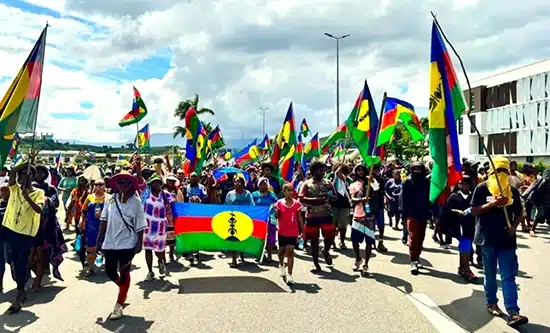Over two months since the uprisings which shook New Caledonia, tanks continue to roll into the South Pacific archipelago as France steps up its efforts to subjugate an overseas territory that is a colony in all but name. It has implemented a military crackdown, jailed uprising leaders and arrested nearly two thousand people since the Kanak people rose up in May against a proposed electoral reform that would have further undermined the rights of the islands’ indigenous community.
In July, France despatched more gendarmes and armoured assault vehicles to New Caledonia after renewed protests over the round-up of the movement’s leaders. The total of gendarmes, police and military mobilised to the territory since May is now over 3,500. A night-time curfew remains in place in the capital, Nouméa, and gatherings and marches are banned. Since the uprising began 10 people have been killed, 1,848 have been arrested and 145 have been detained, including 13 prominent independence leaders.
Those detained include Christian Tien, the leader of the Field Action Coordination Cell (CCAT), which has played a leading role in demanding independence for the territory it calls Kanaky. He was arrested in June and flown to so-called ‘metropolitan’ France, where he’s been charged with a range of offences including being part of an organised crime gang. He is currently in solitary confinement in a detention centre in Mulhouse, northeastern France. Five other leaders are also being held in solitary confinement in France, and their contact with their lawyers and families has been restricted. The CCAT’s communications chief, Brenda Wanabo, is currently held in Dijon. For the entirety of her 30-hour flight to France she was kept handcuffed, and since her arrest has not been allowed contact with her three children aged four, eight and 13. The French state is determined to criminalise the anti-colonial independence struggle in New Caledonia, denying its protagonists their true status as political prisoners. In a statement in June, CCAT wrote: ‘the French state and its neocolonial justice system intend to reduce the entire Pacific resistance and the revolution that was unleashed on the evening of 13 May to acts of terrorism’, adding that all the prisoners would fight such categorisation through the courts.
The uprisings forced President Macron to suspend his divisive constitutional reform ahead of the snap French legislative elections held in June/July. Because New Caledonia, as a French overseas territory, is considered as ‘part of France’, two new members of Parliament had to be elected to represent the archipelago. In both constituencies, it was a tight race between right-wing loyalists and pro-independence candidates. In the first constituency, which includes Nouméa, a loyalist candidate won with just over three thousand votes more than the Kanak candidate. In the second, veteran pro-independence campaigner Emmanuel Tjibaou won with 57.4% of the vote. Tjibaou is New Caledonia’s first ever indigenous MP. His election was challenged by Nouméa’s hardline, racist French mayor, Sonia Backès, who claimed the election had been stolen. She also used her Bastille Day speech on 14 July to call for the partition of the territory, saying Kanak and ‘western’ values could never be reconciled. It remains to be seen how far Tjibaou, a moderate who condemned ‘violence on all sides’ during the May protests, will push for real independence and for justice for New Caledonia’s political prisoners as he takes his seat in the National Assembly in Paris.
Meanwhile, the islands’ economy, already in decline because of falling world prices for nickel, has been further battered by the recent conflict. Many mines have halted or reduced operations and, with shops, businesses and infrastructure destroyed on a mass scale during the uprisings, nearly 24,000 residents – almost a third of the private sector workforce – face unemployment. Pension payments are no longer guaranteed, and free access to healthcare may be compromised. Tourism, a pillar of the economy, is at an all-time low. While many white French settlers are choosing to return to ‘the mainland’, the brunt of the economic crisis is being borne by an already impoverished Kanak population. They have no choice but to fight – for control of the islands’ resources and for economic and social independence from the imperialist and racist French state.
Sarah Guebre Egzhiabher
FIGHT RACISM! FIGHT IMPERIALISM! 301 August/September 2024




